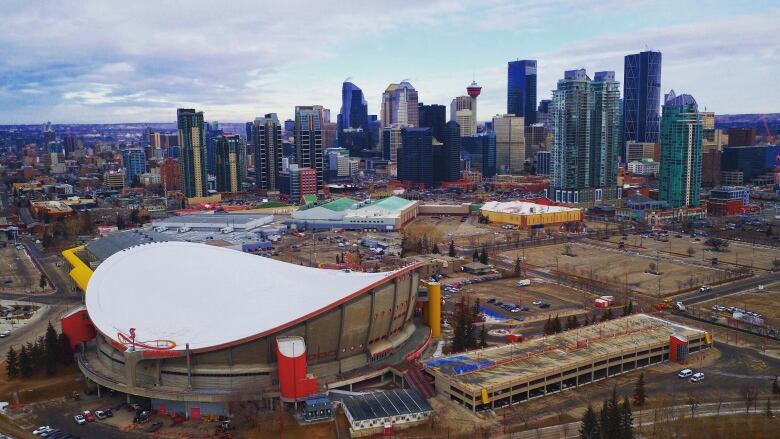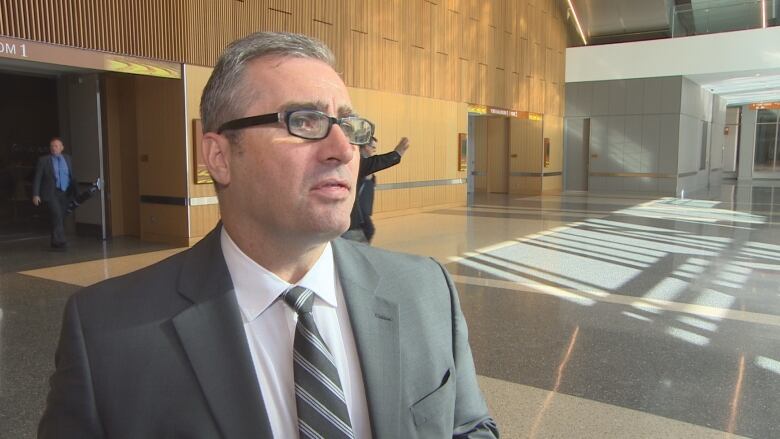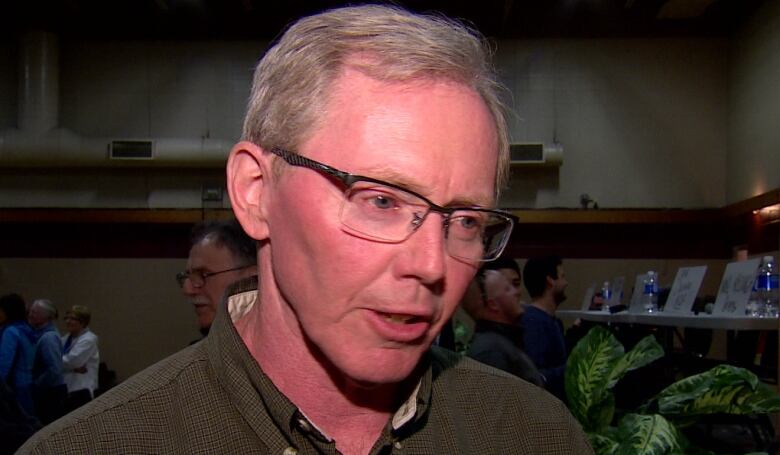ANALYSIS | What if the Flames left Calgary?
Imagine the city without the NHL team. Here are some of the consequences and options

Let's try a thought experiment.
A simple hypothesis: What if the Calgary Flames left the city?
The NHL team's Brian Burke was pretty blunt back in June, saying the team would leave if a new arena wasn't built.
And this week, the war of words over building a new arena for the Flames heated up again.
On Monday, the team's Ken King told a business crowd that the once lucrative team faced economic uncertainty, reigniting speculation the team may abandon Calgary.
Then on Wednesday, while insisting he didn't want to "weigh into politics,"NHL Commissioner Gary BettmantoldPostmedia there was "no prospect" of the Flames' getting a new building in Calgary with Naheed Nenshi leading the city.
Nenshi, who is hoping to be re-elected mayor on Oct.16, remembers the meeting differently.
"He suggested that if the team were to move, if I screwed this up, then that would likely be the end of my political career and it would destroy Calgary," Nenshi told CBC News on Thursday.
But it doesn't really matter whose recollection is correct to work through the potential economic, civic and cultural consequences of the Flames packing up and moving to maybe Quebec City or Seattle.
Profound ramifications if team leaves
Without a doubt, losing the Flames would be a body blow for many in Calgary.
Even now, the team regularly sells out the Saddledome, which seats 19,289.
And the team electrified the city in 1989 when it won its only Stanley Cup championship.
In 2004, the Flames' unexpected run to the NHL finals saw thousands of fans celebrating along the so-called Red Mile on 17th Avenue S.W.
- Flames fall short in Game 4 of Stanley Cup finals
- The Red Mile recounted as the Flames get set for the NHL playoffs
So, for many fans, the prospect of the Flames leaving the city is offside.
And the ramifications of losing a team are profound.
Just ask Winnipeg.
Winter in the Manitoba capital is hard enough. But without the city's beloved Jets, it was even worse.
"It was a very tough time in Winnipeg," says Chuck Davidson, president and CEO of the Manitoba Chambersof Commerce.

Davidson,who covered the Jets departure for Phoenix in 1996 as a journalist,says Winnipeg lost the prestige of having an NHL team.
"It was a real loss, in terms of the identity of Winnipeg ... No longer were we a top-ranked city. We were almost like a second-class city," says Davidson.
But the Jets' return in 2011 brought the city's "mojo" back, according to Davidson.
"You can't go anywhere in your community ... where some kid is not wearing Winnipeg Jets' paraphernalia. It's had a significant impact."
Davidson also trumpets the economic benefits of having an NHL team again, saying the new arena "resurrected" the city's downtown.
So, if the Flames leave, will Calgary's economy suffer?
Revitalizing a neighbourhood
Building a new arena in Victoria Park will definitely change the southeast inner-city neighbourhood.
The area is already gentrifying and a new arena could speed up the revitalization of the city's downtown east end.
But a new sports venue with its expanded concourse for shops and restaurants and parking would take up a lot of room in Calgary's core. Space, according to some, that could be better used for more sustainable, dense living.
Noel Keough, an assistant professor of sustainable design at the University of Calgary, thinks the proposed site of the Flames' arena in Victoria Park could be used to build a more "compact, sustainable community" in the heart of the city.

Experts also discount the so-called "evergreen economic argument,"trumpeted often by the owners of sports teams that want public money to subsidize new arenas and stadiums.
The evidence is clear: professional sports venues do not pump up their local economy.
Sports economist Brad Humphreys says it's a myth that professional sports facilities generate new jobs and expand tax revenues.
"There is absolutely zero evidence that a new arena will generate any sort of tangible new economic benefits in Calgary," says the West Virginia University economist.
There is, in fact, "strong consensus among economists" that subsidizing pro sports does not boost local economies.
- Do economists reach a conclusion on subsidies for sports franchises, stadiums, and mega-events?
- Should cities pay for sports facilities?
And it's not like the money Calgarians currently spend on the Flames will disappear.
People have a finite budget for sports and entertainment. Most experts believe that if the Flames went away, Calgarians wouldn't save the money they spend now on the NHL team. That money would go to other sports and entertainment in Calgary.
"So it's really just moving spending around, not generating new spending, unless you think people are drawing on their life savings to go to Flames games, which I don't think anybody is."
It's not just dollars and cents
But imagining Calgary without the Flames is not just an accounting exercise, adding and subtracting the economics of keeping or losing the pro hockey team. Some of the team's benefits aren't just about dollars and cents.
Like Winnipeg's experience, some of the perks of a pro team are intangible.
Ramina Shlah has cheered for the Flames her whole life, inspired by her father, who became a fan when the team first moved to Calgary from Atlanta in 1980.
Recalling the sea of red on 17th Avenue when the Flames made it to the Stanley Cup final in 2004, Shlah says the team is part of Calgary's culture.
"It's a lot of fun It's a good culture," says the writer and moderator of the fan site FlameForThought.com.
"It does give me pride, especially when we do well."
But Shlah isn't really all that worried about her beloved team leaving the city.
And if the Flames do leave, she's pretty confident another team most likely one of the fledgling U.S. NHL franchises would eagerly relocate to the city.
A world-class city
But does Calgary need a pro team to be a world-class city?
Keough says no.
"A great city can stand on its own. It doesn't need these type of prestige ... elements of urban life to feel good about ourselves," says the U of C assistant professor.
Keough believes that without the Flames, Calgary, and its citizens, might spend more time focused on bigger issues that could make the city more liveable for everyone, including diversifying the economy and making the city more equitable.
"We have a very divided society in terms of the haves and the have nots," says Keough. "Putting our focus and energy into transit and affordable housing, those are the things that I think, if there's going to be any public subsidization," that will make Calgary a better city.












_(720p).jpg)


 OFFICIAL HD MUSIC VIDEO.jpg)
.jpg)



























































































